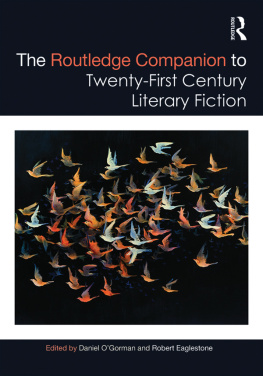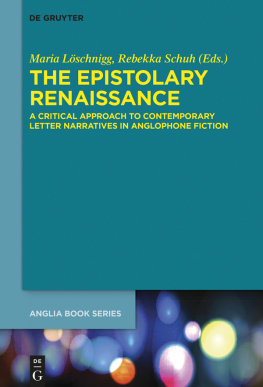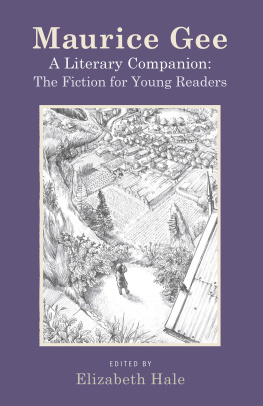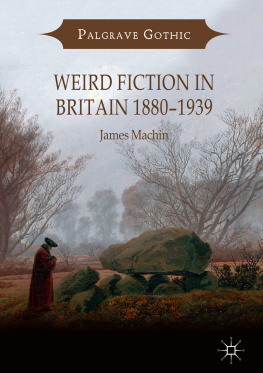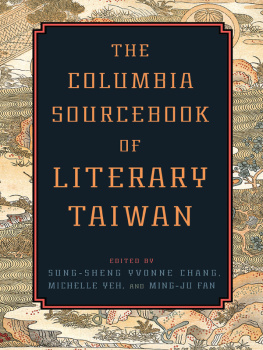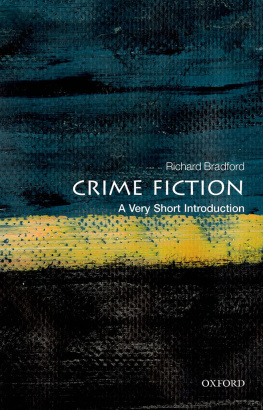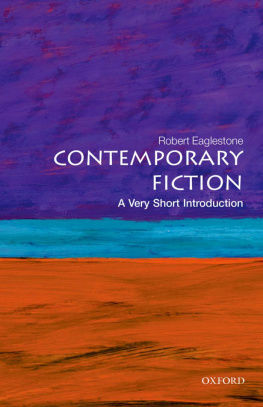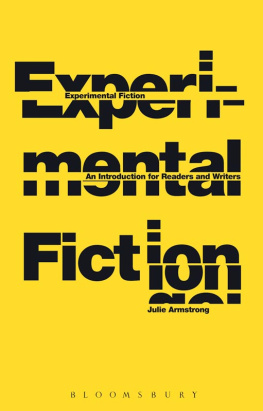Editing a volume like this is a learning experience, and we have both discovered new ideas, texts, theories and trends while working with these fascinating chapters. The project has been long in the making, and in the time between its inception and its publication, the literary landscape has transformed in exciting new ways. Our contributors have worked hard to keep alert to these changes, adapting and honing their arguments as the field has expanded around them, and for this we would like to extend our immense gratitude: their talent and collegiality has made the process a joy. In addition, we would like to thank Zoe Meyer, Stacey Carter and Polly Dodson at Routledge for their patient overseeing of the project, as well as our project manager, Sheri Sipka, for her meticulous attention to detail in the final stages.
Daniel OGorman: I would like to thank Alexandra Parsons for her endless support and generous feedback on ideas for the Introduction; Alex Trott for her friendship and encouragement, and for organising a thought-provoking discussion about metamodernism at Oxford Brookes in March 2018; Adam Alston, Will Philps and Carl-Henrik Bjerstrm for keeping me on my toes about contemporary culture beyond the literary; Sam Solnick for lunchtime chats about contemporary writing; Thomas Hilder for his friendship and perspective; and my students and colleagues at Oxford Brookes over the past two years, for their inspiring ideas about contemporary literature and the literary, especially on the module Contemporary Literature. Thanks also to Amila Lokuge, Veena Naganathar, Asil Tahir, Luke Deller, Joey Bania, Miranda Prag and Viyaasan Mahalingasivam, as well as to Stefan, Eija and Christopher OGorman, for their continuing friendship and support, especially during my occasional spells in academic hermitage. And thanks, finally, to Bob Eaglestone for being a fantastic co-editor on this project.
Robert Eaglestone: Id like to thank my wife, Poppy Eaglestone, and my children, Alex and Bella, for their support, as well as my wider family and friends. My students, on Ideas in Contemporary Fiction have been a constant source of inspiration. And in addition to thanking our contributors above, Id also like to dedicate the book to them too. Contemporary fiction is a growing field, and it seems to me to be characterized by scholars and writers full of energy, intellectual curiosity, enthusiasm and collegiality: the contributors are prime exemplars of these. And so are the many members of the British Association for Contemporary Literary Studies which came into existence during the gestation of this volume: in that respect, we also all owe special thanks to Caroline Edwards, one of the BACLS co-founders, for her commitment and foresight. Finally, perhaps unusually, Id like to dedicate this book to the other co-editor: hes astute, well-informed, indefatigable and thoughtful. Thank you, Dan!
, The Networked Novel, contains revised material from Utopia and the Contemporary British Novel (Cambridge University Press: 2019). Forthcoming.
, Sincerity, contains revised material from Literature Against Criticism: University English and Contemporary Fiction in Conflict (Cambridge: Open Book Publishers, 2016).
, Pastoral, contains revised material from The New Pastoral in Contemporary British Writing (Routledge: 2019). Forthcoming.
, (The) Digital, is adapted from Being Social in a Postdigital World in Catfish and How Should a Person Be? , originally published in The Digital Banal: New Media and American Literature and Culture , by Zara Dinnen. Copyright 2018 Columbia University Press. Used by permission of Columbia University Press.
, Displacement by Emily Hogg, was written with financial support from the Danish National Research Foundation (grant number DNRF127).
, War on Terror, contains revised material from Ambivalent Alterities: Pakistani post-9/11 Fiction in English, originally published in Fictions of the War on Terror: Difference and the Transnational 9/11 Novel , by Daniel OGorman. Copyright 2015 Palgrave Macmillan.
1
The Networked Novel
Caroline Edwards
Contemporary literature, as the term suggests, is defined by its relationship to the condition of being contemporary, or contemporaneity. We can debate the parameters by which we choose to periodise the contemporary: does it, for instance, begin in 1945 with the beginning of the postwar period and its welfarism, immigration and economic stability? Or should we consider the neoliberal recalibration of economic policy with Thatcher and Reagan as building the bedrock for our financial, political and economic situation today? Perhaps we wish to take a more millennial approach and suggest that contemporary literature can be periodised from 2000 onwards, with the terrorist attacks of 9/11 marking the beginning of a new century with its increasingly globalised geopolitics, the rise of stateless networked terrorist organisations and the transnational pressures upon individual nation-states provoked by international financial transactions and the ethical, legal and market frontiers of the digital realm.
Beyond periodising claims, however, lies the paradox of contemporaneity itself. As Giorgio Agamben (2009) notes in his essay What is the Contemporary?, our time is yoked with another time or, rather, many other times, and the relationship between them signifies their contemporary nature. Since to be contemporary suggests being with other times, our perception of contemporaneity is then held up for scrutiny in terms of its distance or proximity to the present now. The study of contemporary literature is thus rooted within a complex philosophical discussion concerning the nature of temporal experience as it mediates between historical time and lived, subjective time. Moreover, the literary form of the novel (with which I shall be concerned in this chapter) is uniquely positioned to convey the qualitatively different kinds of subjective and clock times that organise our lives, as well as the possibilities afforded by narrative organisation to represent such lived times. As Paul Ricoeur enthusiastically observes in Time and Narrative , Vol. 2 : What resources fiction has for following the subtle variations between the time of consciousness and chronological time! (Ricoeur 1985: 107). Examining this relationship between consciousness and narrative time, there has been much written about the times of the modern-ist novel, as well as the postmodernist novel. Modernist narrative innovators such as Virginia Woolf, James Joyce, Dorothy Richardson and Katherine Mansfield were acutely aware of the temporal distinctions to be made between the chronometric regularity of standardised time, and the private times of subjective experience that stretch out the smallest, most mundane moments into extended reveries: throwing up memories into the melee of a chaotic present and secreting distant utopian yearnings. What Henri Bergson referred to as the intuitive, fluid encounters with dure in which the essence of a singular moment may be felt as an interruption into the spatialised time of the clocks steady ticking of seconds, minutes and hours ( ltendu ) (Bergson 1911) can be charted in Woolfs moments of being or Joyces stream of consciousness, which unfolds the fluxional process of temporal experience (for influential readings of time in the modernist novel, see Schleifer 2000; Kern 2003; Randall 2007; Barrows 2011; Murphy 2011). Meanwhile, readings of time in the postmodern novel have clustered around the central questions of proliferating forks and temporal branchings those texts which foreground impossible times, simultaneous times, multiple alternate possible trajectories, and loops of chance containing moments whose temporal plasticity offers narrative analogies to Salvador Dals soft clocks (Heise 1997: 51; Gomel 2010). Here, we find writers such as Christine Brooke-Rose, Alain Robbe-Grillet, Thomas Pynchon and Julio Cortzar: chosen for their complex and contradictory timeframes, their experimentation with non-linear narrative form, and their articulation of the increasingly splenetic, globalised times of media production, spectacle-laden simulation and paranoid consumption from the mid- to late-twentieth century.

